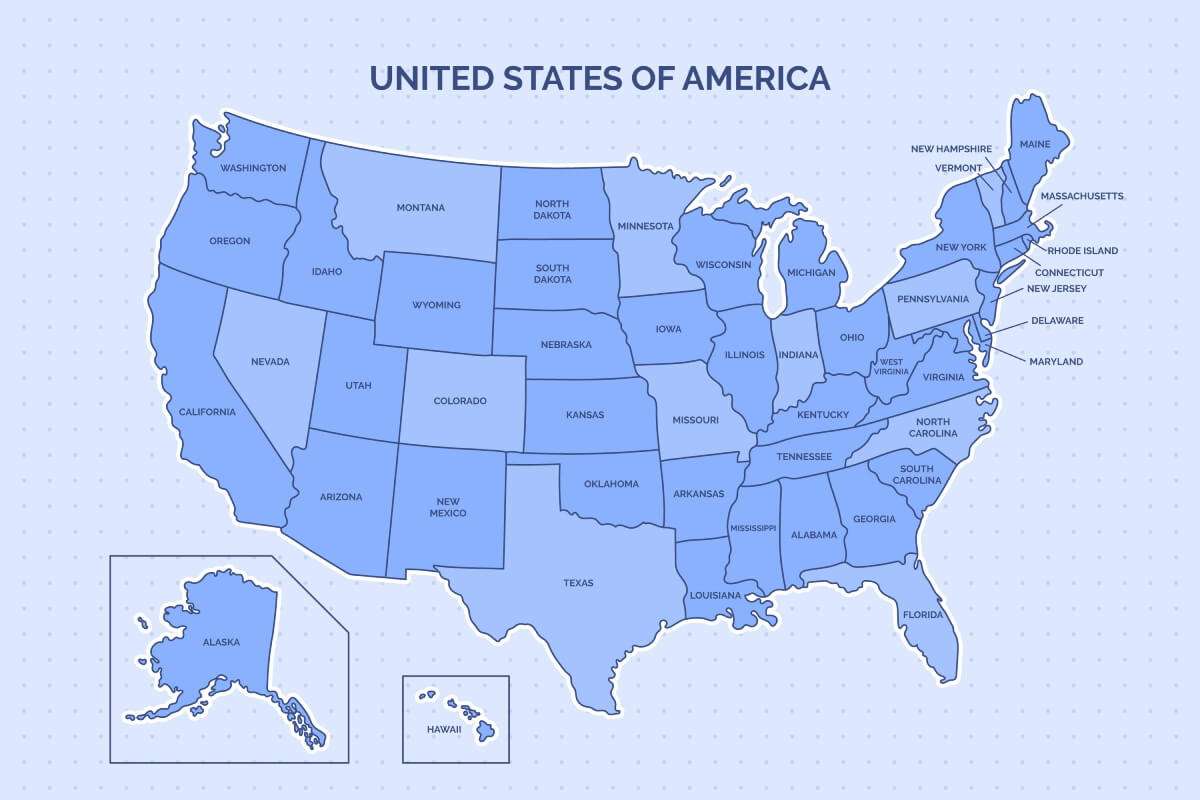"In this world, nothing can be said to be certain, except death and taxes.”
The word itself has become a dreadful topic, and no one likes to talk about it, study it, calculate it, and, probably most importantly, pay it. Nevertheless, tax and tax calculation, especially in developed countries, are everyday topics that cannot be overlooked.
From income to sales to VAT to corporate, taxation is one of the oldest topics of economics that comes in all shapes and sizes. And though you may dread approaching it, the entire concept becomes much more tangible and down-to-earth when you read about it.
In this article, we’d like to accompany you on the not-so-treacherous path of navigating the world of property or real estate tax, learning what it is and how it is calculated, how you can pay it, and the myths and misconceptions surrounding it.
Table of Contents
What is Property Tax?
Property tax in the United States is a tax imposed on real estate, including land and any structures or improvements attached to it. It is primarily levied by local governments, such as counties, municipalities, and school districts, to generate revenue for public services and infrastructure.
Property tax vs. real estate tax
In common usage, “property tax” and “real estate tax” are often used interchangeably, with both terms indicating the tax levied on the ownership of real property, which includes land and any relevant structures.
However, it’s worth noting that the terminology can vary depending on the jurisdiction. Some states or local governments may prefer to use property tax over the other, that is, they consider real estate tax as one kind of property tax.
If we’re discussing the issue of tax in a sense broader than real estate, property tax can refer to more than just the possession of buildings. While real estate property is the most common subject of property tax, it can also include other types of property depending on the jurisdiction, such as:
- Personal property: In some jurisdictions, the property tax may apply to certain types of personal property, such as vehicles, boats, aircraft, etc.
- Intangible property: Some states impose property taxes on intangible assets, such as stocks, bonds, securities, intellectual property, etc., though they’re less common.
- Land: In a few cases, property tax may be levied only on the land itself, without considering any structures or improvements on it. This tax may be applied where the land is considered valuable due to its location or potential use.
The specific types of property subject to taxation, as well as the rules governing assessments and rates, may differ depending on the state, county, or municipality. It is always a good idea to consult the specific laws and regulations of the relevant jurisdiction to determine the exact scope and applicability of property tax.
For the purpose of this article and the sake of convenience, however, we’ll consider these two terms interchangeable.
How is Property Tax Typically Assessed?
It may sound as unbearable as the word itself, but the process of assessing property tax isn’t that awful.
Though there may be small details and intricacies that vary in this process from one locality to another, such as in different states or counties, the main path is typically the same.
Property valuation
The entire process begins with the tax assessor’s office determining the value of the property. This can be done through various methods, such as market value assessments, appraisals, or using a predetermined assessment ratio.
Note: The assessed value is often a percentage of the property’s market value.
Assessment notice
The owner is usually notified of the assessed value through an assessment notice or letter, which includes the assessed value of the property and instructions on how to appeal the assessment if the owner disagrees.
Tax rate determination
The local government, such as the county or municipality, sets the tax rates. These rates are typically expressed as a percentage and may vary for different types of properties (e.g., residential vs. commercial) or for different purposes (general taxation, school districts, etc.).
Tax calculation
The assessed value of the property is multiplied by the applicable tax rate(s) to calculate the annual property tax amount. This calculation determines the tax amount the owner owes for the given tax year.
It’s a little more intricate than a simple formula, but tax calculation boils down to the multiplication below:
Property Tax = Assessed Value x Tax Rate
Tax bill and payment
The local tax collector’s or treasurer’s office generates the property tax bill, which includes the due deadline date and payment options.
Tax collection and enforcement
The day everyone (especially the government) has been waiting for! The tax collector’s office collects property tax payments, and it’s all back to square one.
Note: Failure to pay property taxes on time can result in penalties, interest charges, and, in some cases, legal action. In extreme situations, non-payment of property taxes can lead to tax liens or foreclosure proceedings.

How to Pay Property Tax?
It’s bittersweet, we know! You’ve finally managed to navigate the maze of property taxes and have the final figure written down. The deadline is near, and though you’ll have a lighter wallet, the case for this year’s property tax will be closed, and you’ll soon get a good night’s sleep.
So, how can you make the actual payment? The government’s made it pretty easy for you!
Online payment
Many local governments offer online payment systems where citizens can pay their property taxes via a credit/debit card or an electronic check. These systems are usually accessible through the official website of the local tax assessor’s office or that of your bank.
Payment by mail
Property tax bills are typically sent by mail, and citizens can choose to pay through traditional mail. The bill usually includes a return envelope for convenience. If you choose to mail, double-check in a week or so to ensure your mail has reached its intended recipient.
In-person payment
Some tax offices accept payments in person. Though a little time-consuming, this can be done at the tax assessor’s office or another designated payment location.
Automatic bank withdrawal
Some local jurisdictions offer automatic bank withdrawal programs, where property owners can authorize the government to automatically withdraw the due amount from their bank account on a specified date.
Installment plans
In certain cases, local governments may offer installment plans for property tax payments. The details of such plans vary by jurisdiction, so it’s advisable to check with the local tax office for availability and requirements. But don’t get your hopes up, you know?
Tax Myths: Let’s Debunk Misconceptions
Myth #1: Some states have zero property tax.
Reality: No, they don’t. All 50 US states and D.C. have some percentage of property tax, and there are no states where this tax is zero.
Myth #2: Property tax in the US is only based on the property’s market value.
Reality: Not exactly. While market value is a main factor in property tax assessment, it’s not the only one. Assessors use various methods to determine the assessed value. Other elements, such as assessment ratios and exemptions, can also affect the final tax amount.
Myth #3: Property tax always increases with the increase in property value.
Reality: Again, no. Though property value affects property tax in the US, it doesn’t necessarily mean that tax will increase exactly based on the value. Tax rates and assessments vary between jurisdictions and can be adjusted independently of property values. Also, local governments may have tax caps or other mechanisms to limit tax increases.
Myth #4: Property tax assessments are always accurate.
Reality: Don’t believe that for a second! Tax means people dealing with numbers day in and day out, which can lead to human errors, at least. Assessments can be inaccurate—errors in data, outdated assessments, or changes in property lead to discrepancies. As a homeowner, you have the right to review and appeal property assessments.
Myth #5: Property tax is fixed.
Reality: That’s obviously not true. Property tax in the US can change yearly. Tax rates can be adjusted by the local government, and the assessed value of the property can change due to reassessments or changes in property conditions.
Myth #6: Property tax revenue is used exclusively for schools.
Reality: The revenue from property tax in the US is often used to fund local schools, but that’s not the only usage. Property tax is used to support a range of public services and infrastructure, including public safety, urban maintenance & development, community programs, etc.
Myth #7: Property renovations and/or improvements lead to higher property taxes.
Reality: While renovations and improvements can increase the value of a property, they do not automatically result in higher property taxes. Property taxes depend on various factors, including local assessments, tax policies, exemptions, etc. Some jurisdictions even provide temporary tax incentives for certain types of improvements.
Myth #8: Renters are not affected by property taxes.
Reality: Maybe not directly, but property taxes can indirectly impact renters. Property owners often include property tax expenses when setting rental rates. If property taxes increase, it may lead to higher rents.
Tax Exemptions: Who Are the Lucky Ones?
Under special circumstances, you might be eligible to apply for and receive tax exemptions. The cases for complete tax exemption are rare, but those who qualify for such opportunities will usually be provided with a discount percentage.
The amount of tax exemption, however, differs from one state or county to another, and it is based on various changing criteria. As a result, it is highly recommended that you check with the local government in charge of property taxes and carefully go over your appeal for tax exemption with them.
Senior citizens
Many jurisdictions offer tax exemptions or reduced tax rates for senior citizens, typically based on age and income criteria. These exemptions aim to provide financial relief to elderly individuals who may be living on fixed incomes.
Armed forces veterans
Some countries provide tax exemptions or deductions for the personnel of the armed forces to recognize and honor their service to their country and support their transition back into civilian life. These exemptions vary in scope and eligibility requirements, including service terms and locations, honors and achievements, ranking, possible injuries, etc.
Individuals with disabilities
Tax exemptions or deductions may be available for individuals with disabilities to alleviate the financial burden associated with their condition. These exemptions can cover various aspects such as income, disability expenses, or property.
Local governments will require official declarations and medical approvals to confirm an individual’s disability, and these exemptions, given their sensitive nature, can be reviewed on a case-by-case basis.
Religious organizations
Religious organizations can qualify for tax exemptions or favorable tax treatment in certain jurisdictions. These exemptions are typically granted to recognized religious institutions and may encompass property tax exemptions.
Non-profit or governmental
Non-profit organizations and government entities are often eligible for tax exemptions or tax privileges. These exemptions aim to support the public interest by encouraging charitable activities, public services, and the functioning of government agencies.
Homestead exemptions
Homestead exemptions are property tax exemptions granted to homeowners who use their property as their primary residence.
These exemptions reduce property taxes or exempt a portion of the property’s assessed value from taxation, depending on the jurisdiction’s rules and limits. The purpose of homestead exemptions is to offer relief to homeowners and protect their primary residence from excessive taxation. Bear in mind, though, that these exemptions “reduce,” not “remove”!
States at Each End of the Property Tax Spectrum
Though property tax isn’t much of a determining factor in moving from one state to the other, knowing which states charge more and which ones go easy wouldn’t hurt, especially if you’re a real estate expert or an investor.
US states with the lowest property tax in 2023
Not only does Hawaii have amazing people, perfect weather, and a breathtaking natural environment where paradise comes down to earth, but it also has the lowest property tax rate of the whole country.
It is followed by Alabama, Colorado, and Nevada in the 2nd, 3rd, and 4th places of US states with the lowest property tax rate, while the 5th spot is mutually occupied by Louisiana and South Carolina.
Below are the five lowest property tax rates in the US based on states:
- Hawaii: 0.29%
- Alabama: 0.41%
- Colorado: 0.51%
- Nevada: 0.55%
- Louisiana & South Carolina: 0.56%
US states with the highest property tax in 2023
We know what you’re thinking. One cannot help but notice that US states’ highest property tax rates have somehow pushed toward the northeast.
At 46, Vermont is the last US state with a property tax rate below 2%. After Vermont, New Hampshire breaks that barrier with a tax rate of 2.09%, closely followed by Connecticut. A few stone’s throw away is Illinois, at rank 49, with a tax rate of 2.23%.
And finally, the enviable grand title of the state with the highest property tax rate in the whole of the US, at just below two and a half percent, goes to the Garden State.
- Vermont: 1.90%
- New Hampshire: 2.09%
- Connecticut: 2.15%
- Illinois: 2.23%
- New Jersey: 2.47%

US States Ranked By 2023 Property Taxes
If you didn’t find your state at either end of the property tax range, you can go down the list below.
This table, based on data from WalletHub, shows the average property tax rate in all 50 US states plus the District of Columbia in 2023.
| Rank | State | Avg. Property Tax Rate |
| 1 | Hawaii | 0.29% |
| 2 | Alabama | 0.41% |
| 3 | Colorado | 0.51% |
| 4 | Nevada | 0.55% |
| 5 | Louisiana | 0.56% |
| 6 | South Carolina | 0.56% |
| 7 | District of Columbia | 0.57% |
| 8 | Delaware | 0.58% |
| 9 | Utah | 0.58% |
| 10 | West Virginia | 0.59% |
| 11 | Wyoming | 0.61% |
| 12 | Arkansas | 0.62% |
| 13 | Arizona | 0.62% |
| 14 | Idaho | 0.63% |
| 15 | Tennessee | 0.66% |
| 16 | California | 0.75% |
| 17 | Mississippi | 0.79% |
| 18 | New Mexico | 0.80% |
| 19 | North Carolina | 0.80% |
| 20 | Virginia | 0.82% |
| 21 | Montana | 0.83% |
| 22 | Indiana | 0.83% |
| 23 | Kentucky | 0.85% |
| 24 | Florida | 0.86% |
| 25 | Oklahoma | 0.90% |
| 26 | Georgia | 0.90% |
| 27 | Oregon | 0.93% |
| 28 | Washington | 0.94% |
| 29 | Missouri | 0.98% |
| 30 | North Dakota | 1.00% |
| 31 | Maryland | 1.07% |
| 32 | Minnesota | 1.11% |
| 33 | Massachusetts | 1.20% |
| 34 | Alaska | 1.22% |
| 35 | South Dakota | 1.24% |
| 36 | Maine | 1.28% |
| 37 | Kansas | 1.43% |
| 38 | Michigan | 1.48% |
| 39 | Ohio | 1.53% |
| 40 | Pennsylvania | 1.53% |
| 41 | Rhode Island | 1.53% |
| 42 | Iowa | 1.57% |
| 43 | Nebraska | 1.67% |
| 44 | New York | 1.73% |
| 45 | Wisconsin | 1.73% |
| 46 | Texas | 1.74% |
| 47 | Vermont | 1.90% |
| 48 | New Hampshire | 2.09% |
| 49 | Connecticut | 2.15% |
| 50 | Illinois | 2.23% |
| 51 | New Jersey | 2.47% |
FAQ
Property tax is primarily levied by local governments to generate revenue for public services and infrastructure, such as schools, roads, public safety, and community programs. It helps fund essential services that benefit the community as a whole.


